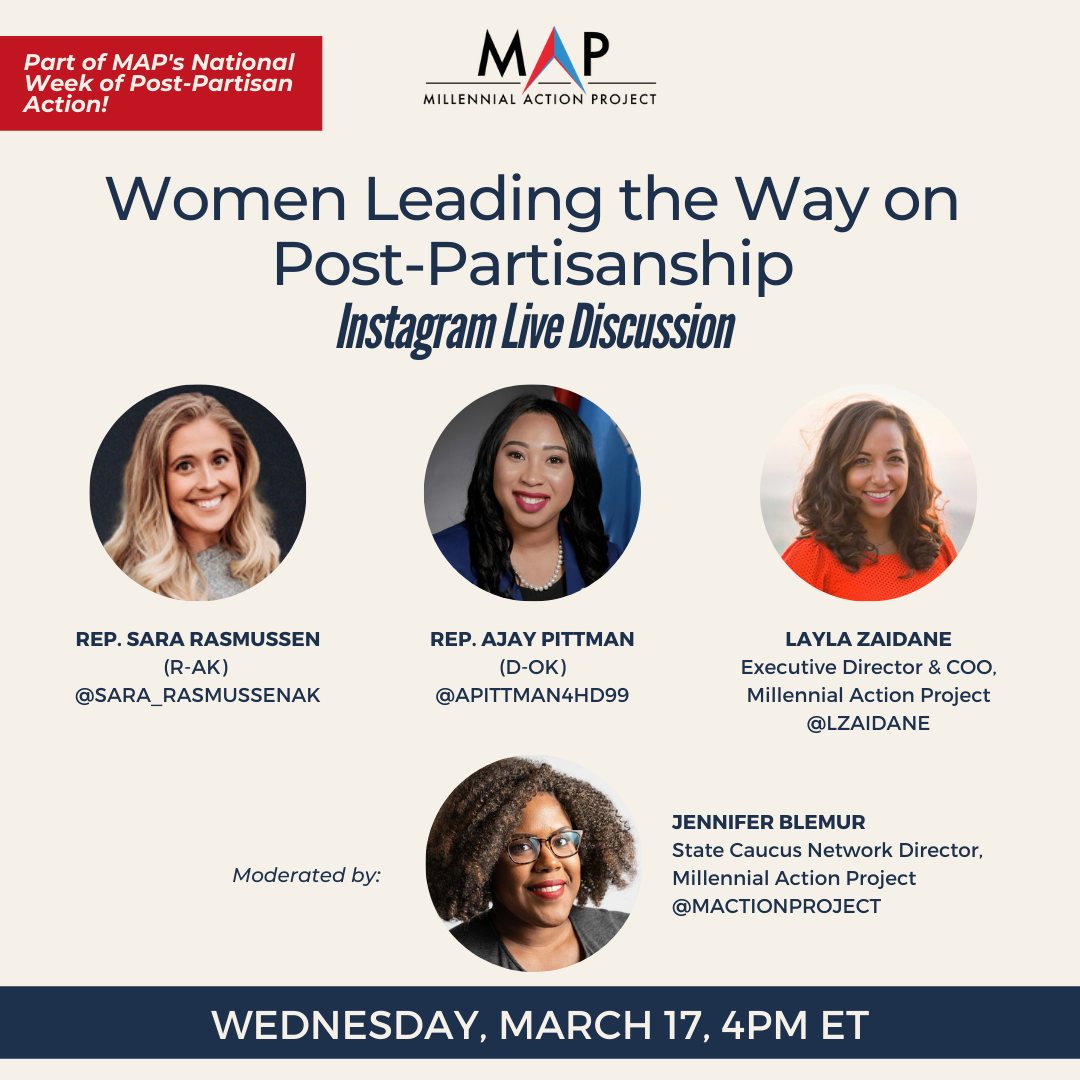On March 17th, in celebration of Women’s History Month, the Millennial Action Project held an Instagram Live discussion focusing on female leadership in politics and the movement to create a post-partisan political culture. The conversation, part of MAP’s National Week of Post-Partisan Action, was moderated by MAP’s State Caucus Network Director Jennifer Blemur. Joining Jennifer were Alaska State Representative Sara Rasmussen, Oklahoma State Representative Ajay Pittman, and MAP’s Executive Director and COO Layla Zaidane.
Jennifer began the discussion by defining post-partisanship, explaining the concept of moving past party divides to collaboratively develop innovative policy solutions. She then asked the panelists what they believe is unique about women’s leadership. Rep. Rasmussen stated that women bring a different perspective to government and other organizations, motivated by a need to balance still-prevalent gender biases as well as obligations like parenthood. Layla continued this line of thought, describing how these societal pressures lead women to be especially intentional and self-reflective in leadership roles. As a result, women are especially equipped to engage in the kind of cooperation that characterizes post-partisanship.
When asked what the public needs to understand about post-partisanship as a practice, Rep. Rasmussen (R) relayed her decision in 2021, as a sophomore legislator, not to join the Alaska state Republican caucus. Instead, she chose to be a “caucus of 1,” understanding that she could more effectively pursue policy solutions by working independently of party orthodoxy. Layla explained how meaningful, empathetic connections between people form the underpinning of effective post-partisanship. This topic that would frame much of the subsequent conversation.
Rep. Rasmussen described firsthand how substantive personal relationships outside of work allow legislators to develop the trust necessary for productive collaboration. “I think that is really crucial when it comes to having the hard conversations of policy, where we may not be completely aligned on an issue. But because we both have a space where we trust each other and we feel like the other person is coming from a place of good intentions, you can figure out where you find the common ground,” she opined.
Rep. Pittman further emphasized the value of connecting with colleagues not as members of a party, but as human beings. As a second-generation Oklahoma state legislator, she grew up in the milieu of state politics. The longstanding relationships she brought to the legislature as a result have provided a foundation of trust with fellow legislators, allowing her to engage in real policymaking cooperation. As Rep. Pittman later articulated, productive relationships require a measure of “authenticity and vulnerability” that acknowledges oneself and others as complex individuals. Layla succinctly captured this point, stating, “To effectively embody this idea of post-partisan you need to understand yourself in order to better connect with other people. Only then can you start to build the bridges in ways that are structurally sound, that are meaningful, and that are connecting two whole humans.”
In light of these understandings, Jennifer prompted the panelists to share instances of post-partisanship from their own careers. Layla cited MAP’s Red and Blue Dialogues, which brought Wisconsin residents from across the political spectrum into discussions about policy issues. These conversations are a powerful example of how good-faith conversations can build understanding and respect between individuals of disparate political outlooks. Rep. Rasmussen shared her experience as a freshman legislator working across the aisle to strengthen Alaska’s laws surrounding domestic and sexual assault. Rep. Pittman lauded the Oklahoma Future Caucus, with its bipartisan co-chairs in both state houses, as a conduit for cross-party collaboration. In fact, she recently formed an Oklahoma Future Caucus extracurricular book club as a way to build meaningful personal connections between her colleagues.
Looking forward, the conversation turned to the future of female leadership in politics and public policy. The panelists all expressed earnest belief that women are on the rise. Though there is still a long way to go, women leaders are entering government with a collaborative, problem-solving attitude that is changing the nature of American politics. Layla observed that, rather than continuing the status quo of partisan gridlock, women are “stepping up and they’re rolling up their sleeves and they’re saying let’s fix it. Let’s find a way. As more and more women take those first steps into public service we’re going to see a lot more initiative on these policies that affect us as a generation, but that have been ignored for years and for decades.”
As Rep. Pittman observed, not only are women in government tackling policy problems that shape future generations, they are also providing powerful examples for the next wave of female leaders.

